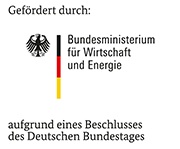14489 BG/1

Hochtemperaturofen in Betrieb
| Period: | 01.09.2005 - 30.11.2007 |
|---|---|
| Funder: | Federal Ministry for Economics and Technology (BMWI, Germany) via AiF |
| Project Manager: | Dr. Holger Steinberg |
| Research Group: | High Temperature Materials |
Modern 9-12% Cr ferritic-martensitic steels are used in conventional power plants for steam lines, boiler piping, superheaters and steam turbines. Since the use of X20CrMoV121 new improved Cr-steels like the P91 and the tungsten and boron alloyed Cr-steel NF616, the HCM12A or E911 have been developed. To improve the efficiency of power plants, supercritical steam parameters up to 650°C and 300 bar are required. Under these conditions martensitic steels have a good creep rupture strength which is an advantage for their use as heat exchanger materials, but the corrosion resistance should be improved. Austenitic steels and nickel-based alloys are potential candidates for increasing the steam temperatures up to 700°C. In order to protect the martensitic steels by diffusion coating treatments, the coating process has to fit the substrate requirements concerning the process temperature and time. Indeed, above a certain temperature, the martensite transforms into ferrite and the material thus looses its mechanical properties. For P91 martensitic steels, the removal of the martensite occurs above 650°C. As a consequence, a new out-of-pack process will be developed. The process consists in enriching the substrate surface with elements that are expected to form a protective oxide layer under service conditions. These elements are: Mn, and Si and a combination of both, which are introduced at high temperature by diffusion into the substrate surface. A high Mn content in the surface zone forms protecting MnCr-spinels. Si is expected to form a diffusion barrier, which could reduce the Cr diffusion to the substrate surface. A diffusion treatment of martensitc Cr-steels with both elements suppose a synergetic effect.
back
Das IGF-Vorhaben Nr. 14489 BG/1 der Forschungsvereinigung DECHEMA e.V., Theodor-Heuss-Allee 25, 60486 Frankfurt am Main wurde über die AiF im Rahmen des Programms zur Förderung der industriellen Gemeinschaftsforschung (IGF) vom Bundesministerium für Wirtschaft und Energie aufgrund eines Beschlusses des Deutschen Bundestages gefördert.
PD Dr. Mathias Galetz
Tel.: +49 6172 89938-993
E-mail: mathias.galetz
Final Report (pdf, 5.1 MB, in German)